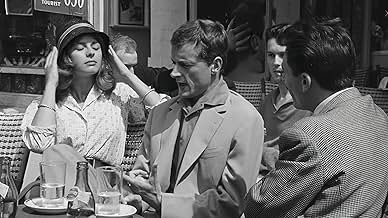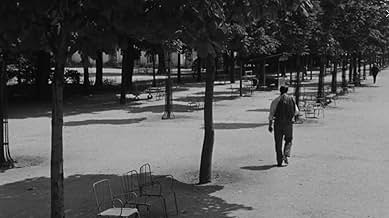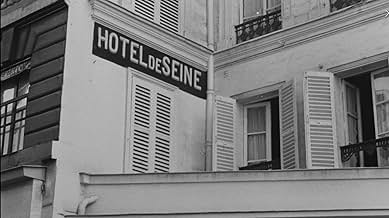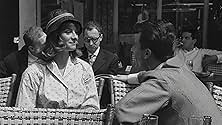Le signe du lion
- 1962
- 1h 43min
CALIFICACIÓN DE IMDb
7.2/10
2.5 k
TU CALIFICACIÓN
Agrega una trama en tu idiomaA French-American in Paris lives by sponging off his working friends, and throws a party using borrowed money when his rich American aunt dies, believing firmly in his horoscope.A French-American in Paris lives by sponging off his working friends, and throws a party using borrowed money when his rich American aunt dies, believing firmly in his horoscope.A French-American in Paris lives by sponging off his working friends, and throws a party using borrowed money when his rich American aunt dies, believing firmly in his horoscope.
- Dirección
- Guionistas
- Elenco
- Premios
- 1 nominación en total
Marie Dubois
- La jeune femme au café
- (sin créditos)
- Dirección
- Guionistas
- Todo el elenco y el equipo
- Producción, taquilla y más en IMDbPro
Opiniones destacadas
The movie's middle section has a pain and desolation perhaps not seen since in Rohmer's work, as the musician slowly slides into homelessness, poverty and borderline madness. Rohmer, with a perfectly measured tone, captures all the tiny escalating humiliations as he wanders through a largely deserted Paris in the heat. Then the musician takes up with a wandering clown, and the movie takes on a broad comic tone again, not seen since in Rohmer, creating an odd symmetry with the movie s early section, when the musician wrongly thinks he's won an inheritance and parties himself into the state of poverty. That kind of symmetry is emblematic of the movie's weakest element - its unenlightening interest in fate and chance and paths of destiny (inherent in the title, in the deus ex machina ending which finds him inheriting the money after all when his cousin's killed in a freak accident, and in the final shot - after his friends have found him and taken him away to restart his life - which pulls away from the earth to show a heavenly constellation (of Leo, I suppose)). There's little here of the smart conversation and introspection that marks Rohmer's later movies, and what there is verges on parody - the smart set gets to seem pretty trivial and inconsequential against the travails of its protagonist. The sequences of him eyeing food, eavesdropping on snippets of life, trying unsuccessfully to shoplift etc. are utterly stark and simple and moving.
The French film Le signe du lion (1962) was shown in the U.S. with the translated title The Sign of Leo. The movie was co-written and directed by
Éric Rohmer.
Jess Hahn portrays Pierre Wesselrin, who is a decent enough guy, and a talented violinist and composer. Pierre's weakness is that he doesn't really have a source of income. He drifts along by accepting gifts from his friends.
One day, he receives a message that he's become rich. Armed with that expectation of money, he borrows from his friends and throws a magnificent party. The only problem is that he didn't actually become rich, and now he's down and out.
Usually, he would just turn to his friends for help, but they are all out of town. It never occurs to him to get a job, or even play the violin as a busker. What he does instead is walk.
My next sentence about a Rohmer film should be "they talk, and then they talk some more, and then they keep talking." Not this time! What Pierre does is walk. Then he walks some more, then he keeps walking.
Jess Hahn is a fine actor, and the film works because we can believe what we see on screen. Quite a bit of this film takes place outside as Pierre walks. It would probably work better on the large screen, but it worked well enough on DVD. The movie has a good IMDb rating of 7.3. I thought it was better than that and rated it 8. P.S. Watch for the incomparable Stéphane Audran in a small role as the hotel owner who turns Pierre out into the street when he can't pay his bill.
Jess Hahn portrays Pierre Wesselrin, who is a decent enough guy, and a talented violinist and composer. Pierre's weakness is that he doesn't really have a source of income. He drifts along by accepting gifts from his friends.
One day, he receives a message that he's become rich. Armed with that expectation of money, he borrows from his friends and throws a magnificent party. The only problem is that he didn't actually become rich, and now he's down and out.
Usually, he would just turn to his friends for help, but they are all out of town. It never occurs to him to get a job, or even play the violin as a busker. What he does instead is walk.
My next sentence about a Rohmer film should be "they talk, and then they talk some more, and then they keep talking." Not this time! What Pierre does is walk. Then he walks some more, then he keeps walking.
Jess Hahn is a fine actor, and the film works because we can believe what we see on screen. Quite a bit of this film takes place outside as Pierre walks. It would probably work better on the large screen, but it worked well enough on DVD. The movie has a good IMDb rating of 7.3. I thought it was better than that and rated it 8. P.S. Watch for the incomparable Stéphane Audran in a small role as the hotel owner who turns Pierre out into the street when he can't pay his bill.
I expected this to be more about horoscope sign but it ended up being about man walking for 100 minutes... Rohmer's debut is strong in the first half but then miserably fails to keep that pacing and ends up being quite boring. The ending just felt unjustified and undeserved, also it doesn't help the fact that our lead character is piece of trash.
I saw this very hilarious film a long time ago. It's about the twists of fate in the life of an American in Paris.
Jess Hahn plays a bohemian musician living in the margins of society. He gets information about a shortcoming heritage and believes he's in for big money. He spends all his savings. However, the money is given to his distant cousin.
This starts a downward spiral in the musician's life, as he loses his flat and turns into a clochard dragging along the hostile streets of Paris, trying to survive. These sharp shots are the best stuff in the film: in the first half it uses some of the typical clichés of the French New Wave. There's a nice cameo from Jean-Luc Godard as a weird party-guest.
This isn't like later Rohmer at all, but it's still an original, funny, and moving film. I remember reading somewhere, that this movie was a critical and economical failure for Rohmer... anyway, I think it was more than a good start!!
Jess Hahn plays a bohemian musician living in the margins of society. He gets information about a shortcoming heritage and believes he's in for big money. He spends all his savings. However, the money is given to his distant cousin.
This starts a downward spiral in the musician's life, as he loses his flat and turns into a clochard dragging along the hostile streets of Paris, trying to survive. These sharp shots are the best stuff in the film: in the first half it uses some of the typical clichés of the French New Wave. There's a nice cameo from Jean-Luc Godard as a weird party-guest.
This isn't like later Rohmer at all, but it's still an original, funny, and moving film. I remember reading somewhere, that this movie was a critical and economical failure for Rohmer... anyway, I think it was more than a good start!!
It is generally easy to detect stylistic or thematic indicators of what is to come in the first features of directors of originality. There are however notable exceptions such as Kazan's "A Tree Grows in Brooklyn", a worthy but wholly commercial venture, that give little of their creators away. Erich Rohmer's "Le Signe du Lion" however is in an altogether different category. You would expect something of the director's unique way of looking at the world to be present in what is in every sense a significant example of early French New Wave cinema and yet there is nothing I can detect that links it with, for example, "Ma Nuit Chez Maud" or the "Four Seasons" tetralogy. Rohmer went on to become the master of the conversation piece where characters chat endlessly about their philosophy of life, the interchange with others being all-important. How is it that in "Le Signe du Lion" there is so little in the way of dialogue and that in the lengthy central part of the film we simply observe the main character wandering the streets of Paris bereft of friends and money? Pierre is a forty-something American musician who does not appear to have achieved much apart from a violin sonata that often punctuates the film in a way that is again untypical of a director who tends to use very little and more often no background music. Equally untypical is this character who shows little interest in interreacting with others unless it be to touch them for money, the lack of which is the root of his downfall. "Le Signe du Lion" is therefore unique in Rohmer's output in being a solo piece. Other characters are around but they scarcely matter. This is his "Carrie" but unlike the Wyler masterpiece there is no Carrie, only a Hurstwood who slides down the slippery slope into degradation when an expected legacy fails to materialise and friends he might borrow from are all away on holiday. Like Hurstwood, Pierre suffers early on from the tragedy of his only suit being ruined. Later this is followed by his only pair of shoes falling apart. From then on it is but a short step to his acceptance of the lifestyle of a tramp and beggar. The term "road movie" like "film noir" has become a matter of common parlance. May I be allowed to coin a term, that I am not aware of having been used, for a particular genre - "street movie" - one that depicts characters wandering in a city, often round and round in circles in search of something that eludes them, the city becoming progressively more alien. Such a genre would include "Odd Man Out", "Bicycle Thieves", "The Third Man" and certainly this early work by Rohmer. Perhaps because it is so untypical of its director it has become undeservedly overshadowed by works such as "Le Beau Serge", "Les Quatre Cent Coups" and "A Bout de Soufflé" and yet, particularly in the extended sequence of Pierre shuffling aimlessly around the streets of Paris, it can hold its own in this august company. A rather glib ending apart, it remains of of Rohmer's finest achievements.
¿Sabías que…?
- TriviaEric Rohmer's first feature film.
- Citas
Pierre Wesselrin: I am everything: American, Austrian, Swiss...
- ConexionesReferenced in Der Stadtstreicher (1966)
Selecciones populares
Inicia sesión para calificar y agrega a la lista de videos para obtener recomendaciones personalizadas
- How long is Sign of the Lion?Con tecnología de Alexa
Detalles
- Fecha de lanzamiento
- País de origen
- Idiomas
- También se conoce como
- Sign of the Lion
- Locaciones de filmación
- Productora
- Ver más créditos de la compañía en IMDbPro
Taquilla
- Total a nivel mundial
- USD 792
- Tiempo de ejecución1 hora 43 minutos
- Color
- Mezcla de sonido
- Relación de aspecto
- 1.66 : 1
Contribuir a esta página
Sugiere una edición o agrega el contenido que falta

Principales brechas de datos
By what name was Le signe du lion (1962) officially released in Canada in English?
Responda



























